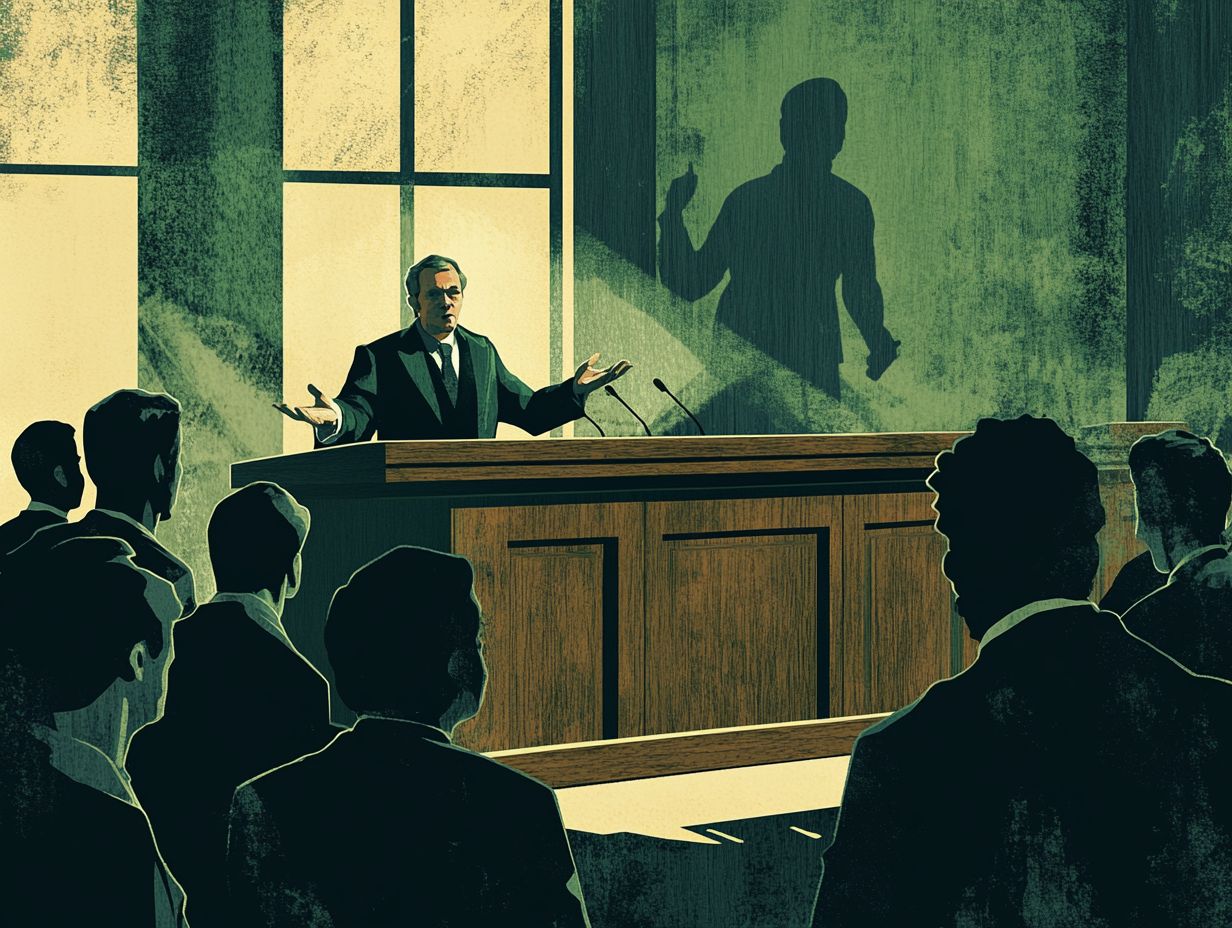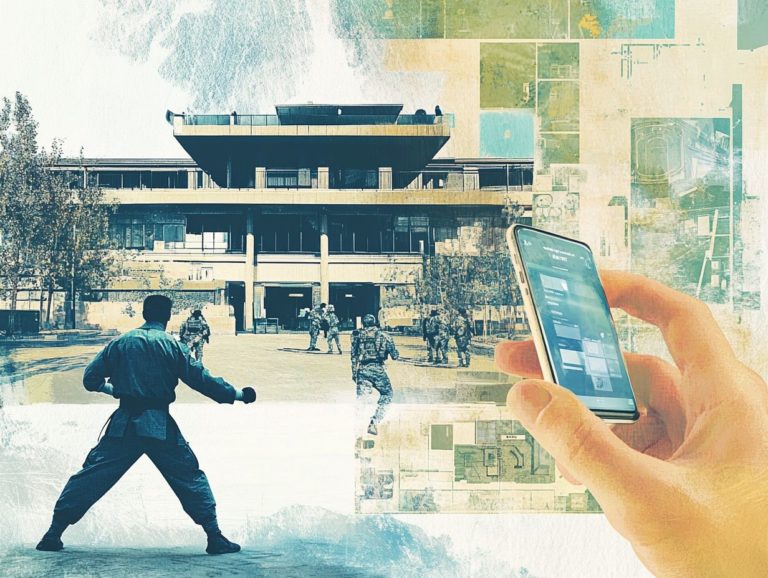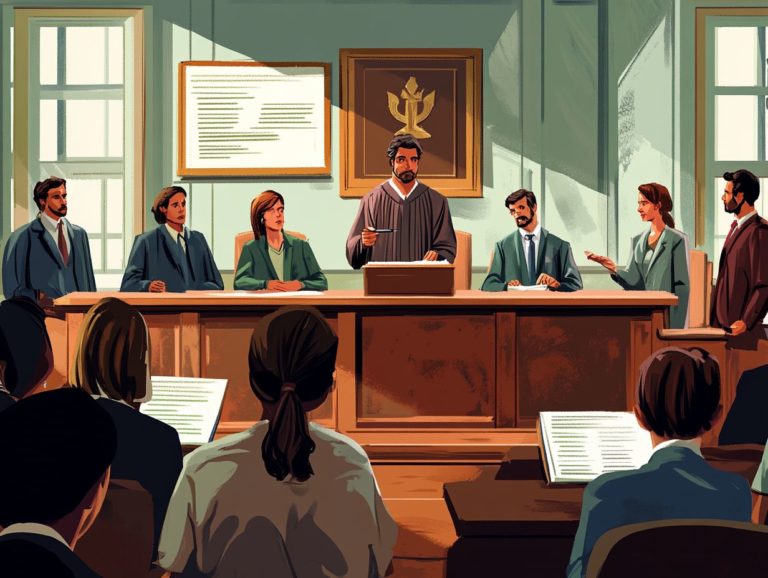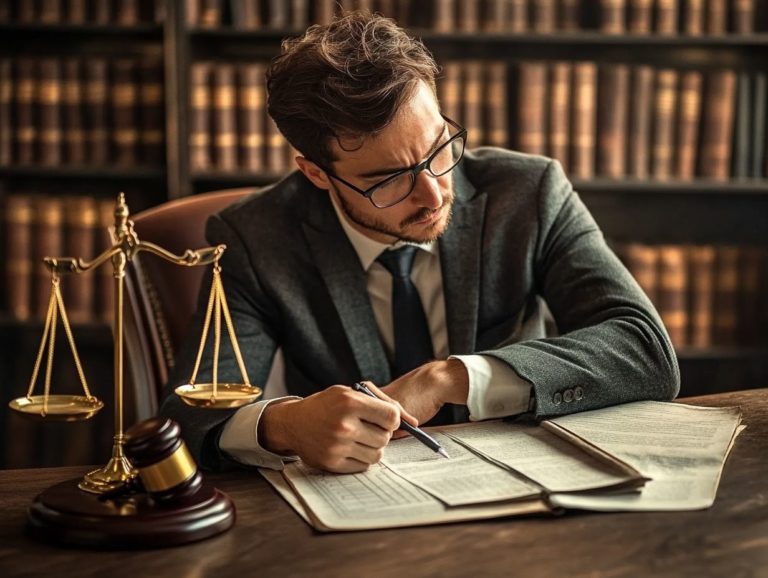How to Leverage Mistaken Identity in Defense
Mistaken identity is a complex and often misunderstood element of legal defense. It can significantly influence the trajectory of a case.
Let s explore what mistaken identity really means and its variations. Understanding this issue is crucial as it can profoundly impact legal outcomes.
This article discusses how to leverage mistaken identity in your defense. We ll feature real-life case studies that illustrate successful outcomes.
Join us as we unravel the intricacies of this essential topic and its implications within the legal landscape.
Contents
- Key Takeaways:
- Understanding Mistaken Identity in Defense
- The Role of Mistaken Identity in Legal Defense
- Factors that Contribute to Mistaken Identity
- Strategies for Leveraging Mistaken Identity in Defense
- Case Studies of Successful Defense with Mistaken Identity
- Frequently Asked Questions
- 1. What steps should I take to defend myself against mistaken identity charges?
- 2. Can I still be convicted if I was mistaken for the actual perpetrator?
- 3. Is mistaken identity a common defense strategy?
- 4. Can I use mistaken identity as a defense if I have a criminal record?
- 5. What type of evidence can be used to prove mistaken identity?
- 6. Can I use mistaken identity as a defense if I have already admitted to the crime?
Key Takeaways:

Mistaken identity can have a significant impact on a legal defense case. It’s important to understand its definition and types.
Factors such as eyewitness misidentification and faulty evidence contribute to mistaken identity. However, there are strategies to leverage in defense.
By gathering strong evidence and building a solid case, mistaken identity can lead to positive outcomes, as demonstrated in real-life case studies.
Understanding Mistaken Identity in Defense
Understanding mistaken identity is essential for navigating criminal justice, especially in California. Wrongful convictions may stem from police misconduct and emotional turmoil faced by defendants.
Mistaken identity can have dire consequences. It subjects individuals to criminal liability for offenses they did not commit.
By analyzing the nuances surrounding mistaken identity, you can gain a deeper appreciation for the legal defense strategies available to safeguard defendants’ rights.
The Role of Mistaken Identity in Legal Defense
The significance of mistaken identity in legal defense is profound. It often acts as a crucial element in establishing reasonable doubt in the criminal justice system.
As a defense attorney, you must navigate the intricate web of case details, forensic evidence, and witness testimonies. This is essential to safeguard the rights of defendants who have been wrongfully accused.
Your expertise in addressing these complexities can make a significant difference in the pursuit of justice.
How It Can Impact a Case
Mistaken identity can profoundly influence a case, leading to emotional upheaval for the defendant. It alters the trajectory of legal proceedings in criminal matters.
This unsettling phenomenon complicates the quest for justice and can plunge individuals into severe psychological distress if wrongfully accused.
The fear and anxiety from being misidentified can impact mental health and overall well-being. It can tarnish reputations and create enduring social stigmas.
Effective defense strategies are essential to counter these effects. They involve:
- Thorough fact-checking,
- Meticulous exploration of witness testimonies,
- The incorporation of expert witnesses to expose inconsistencies.
Such approaches not only aid in exonerating the accused but also weave a narrative that underscores their innocence. This ultimately restores peace of mind and equips individuals to navigate the aftermath of their ordeal with greater resilience.
Factors that Contribute to Mistaken Identity

Numerous factors contribute to mistaken identity, such as the reliability of eyewitness testimonies and instances of police misconduct. Systemic challenges within the criminal justice system particularly in California also play a significant role.
These complexities can complicate legal defenses and may ultimately result in wrongful convictions under the California Penal Code.
If you or someone you know has faced mistaken identity, don t hesitate reach out for legal help today!
Common Factors and Examples
Common factors that lead to mistaken identity include poor lighting conditions, heightened stress during a crime, and flawed police procedures. Each of these elements can contribute to emotional turmoil.
Take the infamous case of Ronald Cotton, for example. Eyewitness misidentification was pivotal in his wrongful arrest for a crime he didn t commit. The crime unfolded in a dimly lit area, making it nearly impossible for witnesses to accurately recall the suspect s features.
The pressure cooker environment of a police lineup, combined with the witnesses’ stress and fear, only amplified the problem, resulting in Cotton s misidentification.
This case reminds us of how external factors can distort perceptions, profoundly impacting the lives of those wrongfully accused. It highlights the urgent need for reforms in legal processes to prevent such injustices from occurring in the future.
Strategies for Leveraging Mistaken Identity in Defense
Leveraging mistaken identity as a defense requires carefully crafted strategies from defense attorneys. You must employ forensic evidence, enlist expert testimonies, and conduct thorough case analyses to safeguard the rights of the defendant.
Each element plays a crucial role in building a compelling case that effectively challenges the prosecution’s claims.
Gathering Evidence and Building a Case
Gathering evidence and building a compelling case around mistaken identity is crucial for establishing reasonable doubt and securing a favorable outcome for defendants. Paying close attention to detail is vital in this process, as each piece of evidence can highlight discrepancies in eyewitness accounts or police identifications.
Your legal team should compile comprehensive documentation, including surveillance footage, records of alibis, and physical evidence that may contest the claims against you.
Expert testimonies can provide invaluable insights, whether through scientific analysis or psychological evaluations, helping to contextualize how misinterpretations can arise.
By thoroughly preparing this foundation, your legal representatives can effectively challenge the validity of identity assertions and advocate for your innocence.
Case Studies of Successful Defense with Mistaken Identity

Case studies showcasing successful defenses against mistaken identity illustrate the profound effect that dedicated legal advocacy can have in addressing wrongful convictions.
Particularly noteworthy are organizations like the California Innocence Project, which demonstrate how tireless efforts in the legal arena can lead to transformative outcomes for those wrongfully convicted.
Real-life Examples and Outcomes
Real-life examples of mistaken identity provide valuable insights into the outcomes of various cases and the emotional turmoil defendants endure throughout the legal process. These instances often shed light on the fragility of eyewitness testimony and its critical role in convictions.
Consider the cases where wrongfully accused individuals spend years behind bars; these situations underscore the profound impact on their lives, families, and communities.
As a defense attorney, you must navigate these complex emotional landscapes while advocating fiercely for your clients’ rights. These scenarios highlight the urgent need for reforms within the criminal justice system, including enhanced training for law enforcement and the implementation of more reliable identification procedures.
By examining the consequences of such errors, you can approach cases with heightened scrutiny and awareness, ultimately striving for a more just legal framework.
Frequently Asked Questions
1. What steps should I take to defend myself against mistaken identity charges?
To claim mistaken identity, show you weren t at the crime scene. Use witnesses, alibis, or evidence supporting your location.
2. Can I still be convicted if I was mistaken for the actual perpetrator?

You can be wrongfully convicted, even if you’re mistaken for the real perpetrator. Strong evidence against you could lead to a conviction.
3. Is mistaken identity a common defense strategy?
Mistaken identity is a common defense strategy. This is especially true in cases with weak evidence.
4. Can I use mistaken identity as a defense if I have a criminal record?
A criminal record doesn t automatically disqualify you from claiming mistaken identity. However, it might weaken your case.
5. What type of evidence can be used to prove mistaken identity?
You can use various evidence types to prove mistaken identity. Witnesses, alibis, surveillance footage, and DNA testing are all useful.
6. Can I use mistaken identity as a defense if I have already admitted to the crime?
Admitting to the crime makes using mistaken identity as a defense challenging. But if you can show that you were pressured or tricked into admitting, there’s still a chance to use this strategy.






